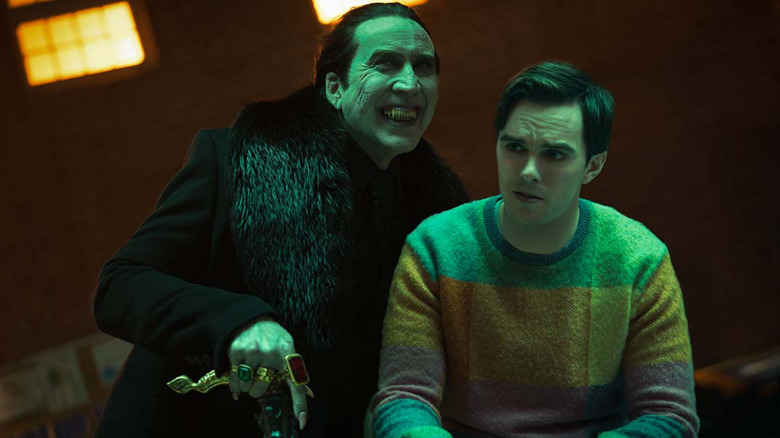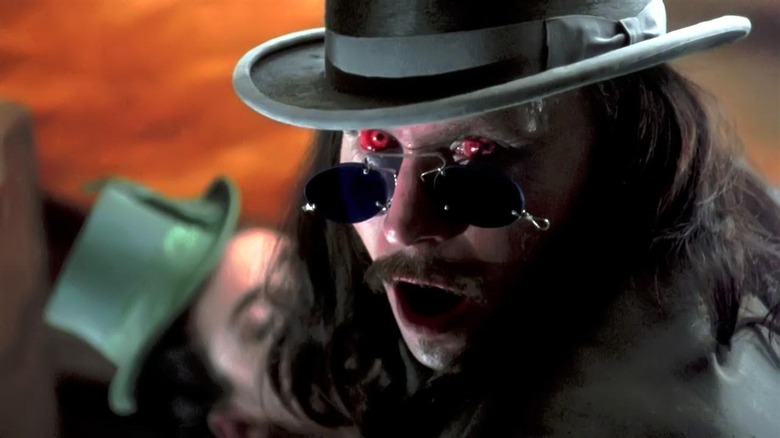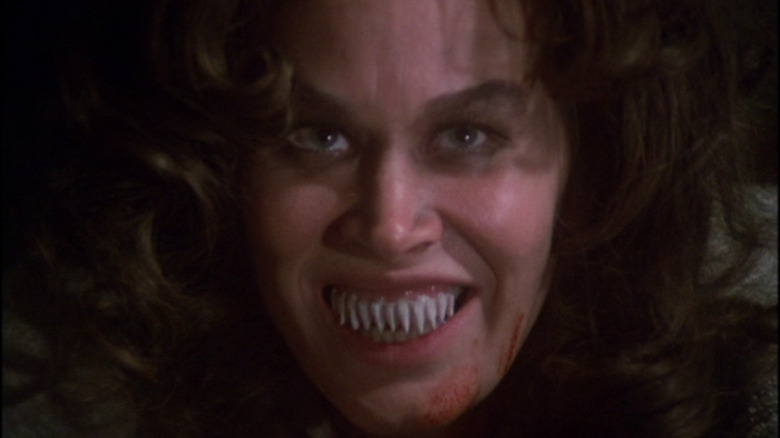Renfield Puts Nicolas Cage In The Dracula Club With Three Other Oscar Winners
The acting style and filmography of Nicolas Cage is probably going to be studied in film school for generations. Cage is a student of film himself, always searching for something new to bring to the craft. A decade ago, in an Ask Me Anything session held on Reddit with Ethan Hawke, the Oscar-nominated actor said Cage is "the only actor since Marlon Brando that's actually done anything new with the art of acting." The pretentious description of Cage's technique would be Nouveau Shamanic, a term Cage took from the equally pretentious book "The Way of the Actor" by professor Brian Bates. Cage cleared that up in an interview with LA Weekly in 2014, where he also spoke about his exploration of various operatic acting styles that he calls "Western kabuki."
Inevitably, the conversations and debates around the craft of acting can demystify the art itself, and the dissection of the entire process can wind up producing some truly eye-rolling moments after hearing pompous actors breakdown their process. But after you win an Academy Award for Best Actor, like Cage did for "Leaving Las Vegas," there's bound to be some curiosity surrounding his unique approach to acting. Add in the fact that Cage will be playing Dracula in the new horror-comedy "Renfield" ("Vampire's Kiss" doesn't count), and there's going to be a lot of interest surrounding what kind of energy Cage is bringing to the part.
Dracula has been portrayed on film more than any other literary character in history, but only three other Oscar winners have ever sank their teeth into the role: David Niven in "Vampira," Jack Palance in the TV movie "Dracula," and Gary Oldman in Francis Ford Coppola's "Bram Stoker's Dracula." So Cage suddenly finds himself in a very exclusive club.
A brief history of Oscar-winning Draculas
The countless portrayals of Count Dracula over the course of film history became even more varied during the 1970's. Frank Langella closed that decade with what is considered one of the most effective performances of the king of vampires to date in 1979's "Dracula." Before that, actors David Niven and Jack Palance took their turn to don the cape in two wildly different performances.
Winning the Oscar for 1958's "Separate Tables," Niven has famously said, "Actors don't retire. They just get offered fewer roles." By the time the role of Dracula came his way in 1974's "Vampira," the offers were probably starting to dry up a little. Director Clive Donner's bizarre vampire comedy plays like a 42nd street grindhouse film, with very mixed results. Longing for his long lost lover, Vampira (Vanessa Graves), Dracula takes the blood of Playboy playmates to resurrect her, which turns her into a dark-skinned woman. In a failed attempt at social commentary about interracial relationships, Dracula ends up turning Black at the end of the film, forcing Niven to appear in Blackface, an extremely regrettable choice.
Also in 1974, Jack Palance (Oscar winner for "City Slickers") gave a fairly drab and uninspired performance in the ABC TV movie "Dracula." Richard Matheson ("I Am Legend') adapted Bram Stoker's work to return the legend to its roots. The result is seeped in melodrama and Palance is sleep-walking through most of it, sadly.
Winning Best Actor for "Darkest Hour," Gary Oldman's heartbreaking performance as the Count in "Bram Stoker's Dracula" is clearly the best out of all the Oscar recipients to date. Co-star Cary Elwes recently told The Hollywood Reporter that Oldman actually slept in a coffin every night during shooting.
Nicolas Cage wants to bring something new to Dracula
Due to his admittedly limited screen time as Dracula in "Renfield," Cage didn't go the extremes that Oldman did, though judging by his gothic-inspired costumes, his wardrobe may be able to compete with the magnificent garbs Oldman wore in Francis Ford Coppola's new classic. Regardless of how much time Cage's take on Dracula actually winds up receiving, every moment he's on screen should be electric. Cage's sensibility and instincts as a performer should dovetail wonderfully with the classic horror traits that have made Dracula such an enduring character over the last hundred years.
No matter what, it sounds like Cage's role in "Renfield" will amount to more than just a glorified cameo that would be more in the vein of the guest stars seen in a classic episode of "What We Do in the Shadows." As Cage told Collider:
"I did have enough screen time to be able to try to develop a pop-art style to the character that hopefully will be a nice contribution to the other performers that have done it, that have had their take on this legendary character in both literature and cinema."
Cage seems to be relishing in the chance to bring something fresh to the character that can match the vibe of "Renfield," which, judging from the trailer, has a tone that lies somewhere between silly and sinister. "What makes it super fun is that it's a comedy," he revealed to Variety. "And when you get that tone right, comedy and horror, like 'American Werewolf in London,' it's a blast. It's got to be a bulls-eye. But that's what I'm looking for, something new to bring to the character, and also that perfect tone of comedy and horror."
Are Nicolas Cage's Dracula teeth inspired by another movie?
It also appears that Cage is bringing a real sense of menace to Dracula that will actually instill a real sense of fear and dread. In the trailer, Renfield (Nicholas Hoult) attends a support group for people in toxic relationships, and when Cage shows up in full vampire regalia, it looks like everyone there is in store for a truly horrific encounter with the ancient one.
One thing that makes him look so scary are the spiked teeth he's sporting. Although Cage hasn't said it in an interview yet, his fang-toothed smile shown in the trailer looks remarkably like the possessed grin that actress Karen Black gives at the end of "Trilogy of Terror." The 1975 TV movie features three stories featuring Black, but it's the last entry, "Amelia," that everyone remembers. In that story, a Zuni fetish doll comes to life and terrorizes Black throughout her entire apartment until, finally, it possesses her. The final scene shows Black revealing a terrifying smile as she sits by her front door with a kitchen knife, waiting for her unsuspecting boyfriend to come over.
It's a chilling moment, and one that Cage is probably familiar with. In any case, it's another added layer to look for and appreciate when Cage's take on Dracula is finally unleashed.
"Renfield" arrives in theaters on April 14, 2023.


